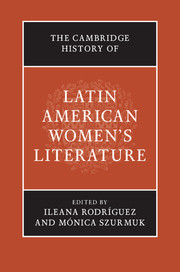Book contents
- The Cambridge History of Latin American Women’s Literature
- The Cambridge History of Latin American Women’s Literature
- Copyright page
- Dedication
- Contents
- Notes on Contributors
- Book part
- Introduction
- Part I Women in Ancient America: The Indigenous World
- Part II Women Writers in Creole Societies: Nation Building Projects
- Part III Women Writers In-Between: Socialist, Modern, Developmentalists, and Liberal Democratic Ideals
- 12 Women Writers in the Revolution
- 13 Revolutionary Insurgencies, Paradigmatic Cases
- 14 The Women of the Avant-Gardes
- 15 Dissident Cosmopolitanisms
- 16 Boom,Realismo Mágico– Boom andBoomito
- 17 Poetry-Fugue
- 18 Mexican Migrations
- 19 Displaced Selves
- 20 The View from Here
- 21 Women Writing in the Andes
- 22 Rebellion, Revision, and Renewal
- 23 Central American Women’s Literature
- 24 Writing Violence
- 25 New/Old Indigenous Paradigms in Maya Women’s Literary Production
- 26 Genres of the Real
- 27 Performances
- 28 Mothers and Children in Biopolitical Networks
- Part IV Women Writers in a One–World Global System: Neoliberalism, Sexuality, Subjectivity
- Bibliography
- Index
- References
16 - Boom,Realismo Mágico– Boom andBoomito
from Part III - Women Writers In-Between: Socialist, Modern, Developmentalists, and Liberal Democratic Ideals
Published online by Cambridge University Press: 05 November 2015
- The Cambridge History of Latin American Women’s Literature
- The Cambridge History of Latin American Women’s Literature
- Copyright page
- Dedication
- Contents
- Notes on Contributors
- Book part
- Introduction
- Part I Women in Ancient America: The Indigenous World
- Part II Women Writers in Creole Societies: Nation Building Projects
- Part III Women Writers In-Between: Socialist, Modern, Developmentalists, and Liberal Democratic Ideals
- 12 Women Writers in the Revolution
- 13 Revolutionary Insurgencies, Paradigmatic Cases
- 14 The Women of the Avant-Gardes
- 15 Dissident Cosmopolitanisms
- 16 Boom,Realismo Mágico– Boom andBoomito
- 17 Poetry-Fugue
- 18 Mexican Migrations
- 19 Displaced Selves
- 20 The View from Here
- 21 Women Writing in the Andes
- 22 Rebellion, Revision, and Renewal
- 23 Central American Women’s Literature
- 24 Writing Violence
- 25 New/Old Indigenous Paradigms in Maya Women’s Literary Production
- 26 Genres of the Real
- 27 Performances
- 28 Mothers and Children in Biopolitical Networks
- Part IV Women Writers in a One–World Global System: Neoliberalism, Sexuality, Subjectivity
- Bibliography
- Index
- References
Summary
Keywords
- Type
- Chapter
- Information
- The Cambridge History of Latin American Women's Literature , pp. 278 - 295Publisher: Cambridge University PressPrint publication year: 2015
References
Works Cited
- 4
- Cited by

